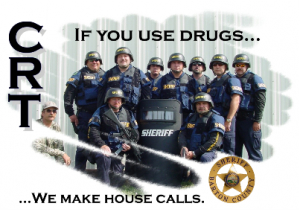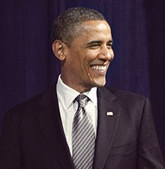BLOG
Obama Signs Synthetic Drug Ban Bill
"Bath salts" and "fake weed" are now banned on federal law after President Obama signed into law the FDA safety bill to which the bans were attached.
A Comically Dishonest Defense of the Drug War
[inline:drugwarhousecalls.jpg align=right]There's a fun little debate series over at U.S. News & World Report featuring some of the usual suspects squaring off over whether the drug war is the best or worst thing in the world (well, it can't be both). My favorite part is Kevin Sabet's attempt to make the drug war sound about as wholesome as a hug from a nun, which he accomplishes by pretending no one ever gets arrested for doing drugs.
Did You Know? Facts About Switzerland's Heroin Maintenance Programs, on DrugWarFacts.org
DrugWarFacts.org, a publication of Common Sense for Drug Policy, is an in-depth compilation of key facts, stats and quotes on the full range of drug policy issues, excerpted from expert publication
Massachusetts Medical Marijuana Initiative Makes Ballot
It looks like Massachusetts has a good shot at becoming the 18th medical marijuana state. An initiative there has qualified for the ballot.
Arkansas Medical Marijuana Signatures Handed In
Arkansas proponents for a medical marijuana initiative met a critical deadline last week, but still have thousands of signatures to gather if they're going to make the November ballot.
Singapore to Relax Death Penalty for Some Drug Traffickers
Hard-line Singapore has announced it is modifying its mandatory death sentence for drug traffickers.
Drug War Snapshot: Ocean City, Maryland
The police in Ocean City, Maryland, are on a mission to maximize marijuana arrests, and they're doing quite well at it. Factor that in to your vacation plans.
Drug War Snapshot: Nueces County, Texas
In Corpus Christi, police have been arresting a thousand people a year on drug charges.
Drug War Snapshot: Volusia County, Florida
The criminal justice system in Volusia County, Florida, is running largely on the drug war if last Friday's jail bookings are any indication.
Oregon Marijuana Initiative Hands in Final Signatures
Oregon's OCTA marijuana legalization initiative has handed in a final 57,000 signatures.
Georgia Puts Welfare Drug Testing on Hold
Georgia's governor was quick to sign a welfare drug testing bill into law, but now he wants to wait for a legal challenge to a similar law in Florida before implementing that law that was suppo
Mexico President-Elect Wants Drug Legalization Talks
Mexico's next president has joined the ever growing chorus of Latin American leaders calling for a serious discussion of drug legalization, even as he announced he would continue to fight the d
Mexico's Drug War Version 2.0 [FEATURE]
Mexico's president-elect is going to rejigger the way the country prosecutes its war on the drug cartels, but no radical changes are app
Puerto Rico Narcotics Officer Killed in Ambush
A Puerto Rican narcotics officer becomes the year's 29th drug war fatality after being ambushed in his vehicle Tuesday night.
Did You Know? Federal Expenditures on the Drug War, from DrugWarFacts.org
DrugWarFacts.org, a publication of Common Sense for Drug Policy, is an in-depth compilation of key facts, stats and quotes on the full range of drug policy issues, excerpted from expert publication
Will Obama Be Better on Drug Policy in His Second Term?
[inline:Obama1.jpg align=right]Marc Ambinder has a totally weird and distracting piece in GQ
Did You Know? Portugal's Decriminalization Record, on DrugWarFacts.org
DrugWarFacts.org, a publication of Common Sense for Drug Policy, is an in-depth compilation of key facts, stats and quotes on the full range of drug policy issues, excerpted from expert publication
Medical Marijuana Update
The feds continue to play hardball in California and local elected officials across the state are grappling with the issues.
Chicago Decriminalizes Marijuana Possession
Following the lead of some of its suburbs, Chicago has decriminalized the possession of less than 15 grams of marijuana for adults.
New Hampshire Medical Marijuana Veto Stands
An effort to override Gov. John Lynch's veto of a medical marijuana bill succeeded in the House but fell short in the Senate.
Pagination
- First page
- Previous page
- …
- 16
- 17
- 18
- 19
- 20
- …
- Next page
- Last page


